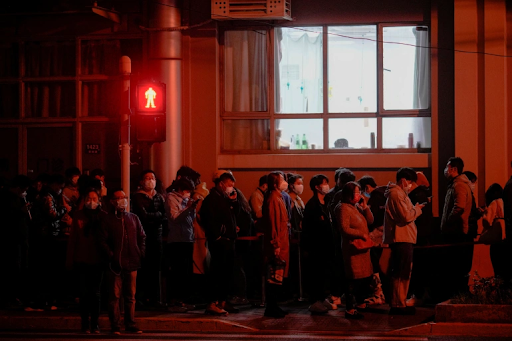Shanghai in Lockdown: A Strain on the Zero-COVID Policy
People line up outside a hospital for mass testing in Shanghai, China. Photo: Aly Song via Reuters
On Sunday, March 27, officials in Shanghai announced that the city would be reentering lockdown after the city recorded a record-high number of new cases since the initial appearance of COVID-19 in the country -- 2,678 cases. The past month has seen cases rise in many parts of China, with Shanghai being one of the urban centers hit the hardest by this new wave.
Previously, Shanghai officials have resisted broad lockdown measures in the city. Fearing the destabilizing effects on the economy, public officials have mostly resorted to “slicing and gridding” the city, locking down and testing individual zones as cases appeared. With the new wave of cases, this strategy was deemed no longer viable. Especially in the context of China’s “zero-COVID” policy, there has been both epidemiological and political pressure to impose these lockdowns.
Shanghai’s plan is divided into two stages. First, Shanghai’s Pudong financial district and the surrounding areas will be locked down from Monday to Friday as the government conducts mass testing. In the second phase of the lockdown, the area west of the Huangpu River, the other side of the city, will start its own five-day lockdown following the first stage.
Amongst the Shanghai public, the news has not been taken lightly. Video footage of a Shanghai supermarket shows a scrambling for goods as the residents of Shanghai face an uncertain future in lockdown. Previously in Xi'an late last year, residents were left without food when officials imposed a city wide lockdown with no government assistance. While Shanghai officials have made plans and distributed resources to those under lockdown, consumer panic remains high.
Volunteers carrying food stuffs to residents of the Fengxian District on Monday. Photo: Wang Yanting via AP
Additionally, early reports from social media paint a grim picture. "Hundreds of people living together, in the cold and bad conditions. Men and women are quarantined together without any privacy. We use public toilets and need to scramble for food. Does the quarantine really help us?" read one post from a user that claims to be staying at one of the expo centers converted into a quarantine zone. Many others complain about similarly messy conditions with a seeming disregard for the safety or privacy of those affected by the new wave.
Until the lockdowns come to pass, the economic and social effects of these latest lockdowns will remain undetermined. However, there is no question that China’s “zero COVID” policies have caused strains amongst the Chinese public. Between the supermarket scrambles and social media posts, there is concern amongst residents of Shanghai about the future. Economically, the CSI Index closed at its lowest point in two weeks following the lockdown’s announcement. Until these lockdowns are resolved, the situation remains a delicate balance for China as it continues to maintain its “zero-COVID” policy.


